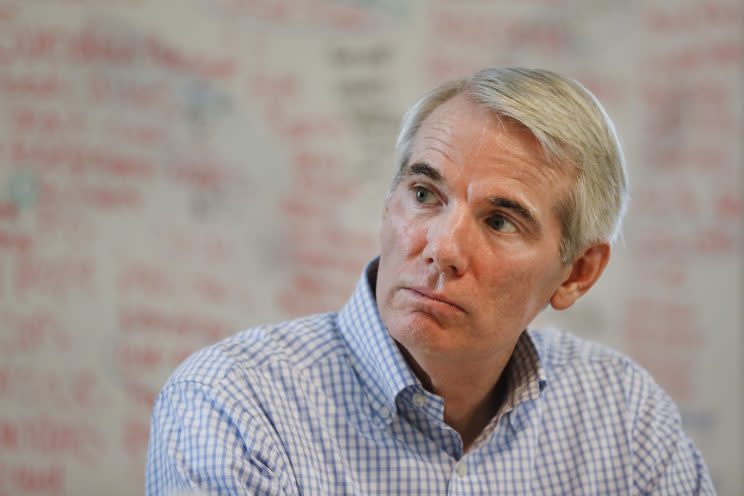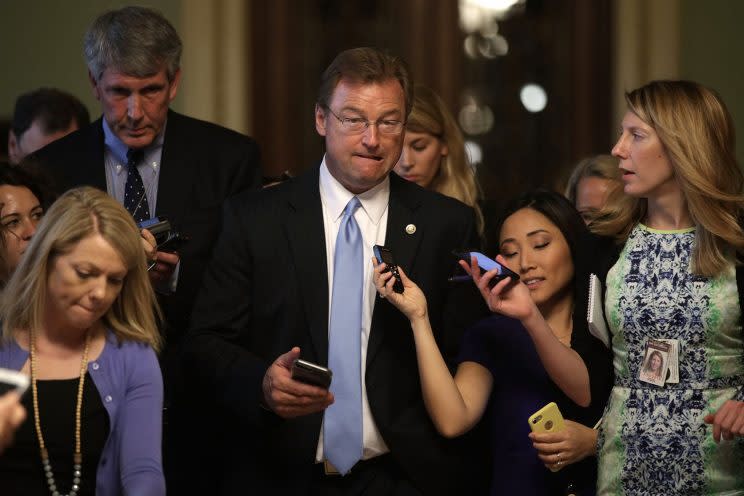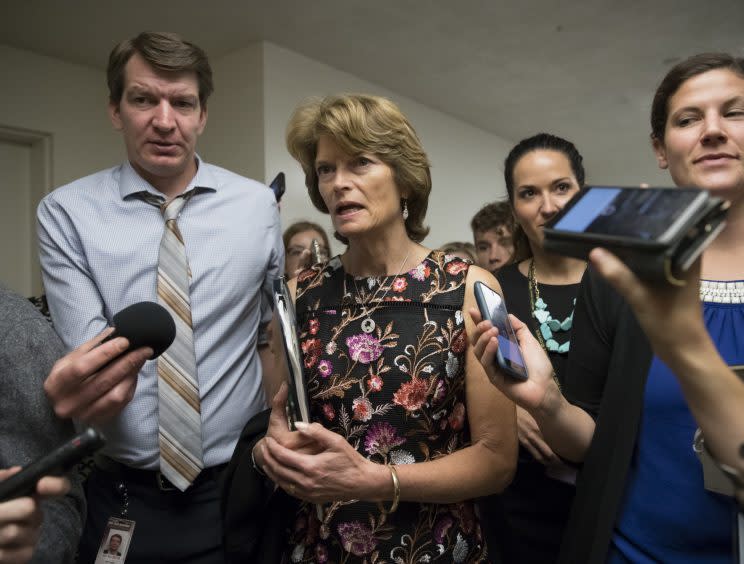The 4 senators who could thwart the revised Senate health care bill

Yahoo News’ “Health Care Declassified” series provides continuing coverage of the Republican efforts to repeal and replace Obamacare. We’ll combine our own reporting with the best insights from around the Internet to give you the latest on the future of health care in America.
With the latest incarnation of the Senate plan to dismantle the Affordable Care Act unveiled Thursday, the scramble is on for GOP leaders to seek out the undecided lawmakers and win them over.
Four such lawmakers — Sens. Shelley Moore Capito, R-W.Va., Rob Portman, R-Ohio., Dean Heller, R-Nev., and Lisa Murkowski, R-Alaska — have said they are undecided after also expressing major reservations about the first version of the bill. Senate Majority Leader Mitch McConnell, R-Ky., likely needs every one of them to vote to bring the bill to the Senate floor, as Sens. Susan Collins, R-Maine, and Rand Paul, R-Ky., say they are firmly opposed to even beginning debate on the issue. McConnell can afford to lose only two of his 52 members to have the bill pass over united Democratic opposition.
Below we take a look at each of the undecided senators:
Shelley Moore Capito, R-W.Va.

For West Virginia’s junior senator, Medicaid could be the deal breaker. The Better Care Reconciliation Act’s proposed rollback of Obamacare’s Medicaid expansions caused her to publicly come out against the bill soon after it was introduced last month, but despite similar provisions in the new version, Capito has yet to denounce it.
In a statement published on her website on Thursday, Capito said she continues to have “serious concerns about the Medicaid provisions,” but that she looks “forward to reviewing the revised Senate health care legislation.”
One in six nonelderly residents of West Virginia would become uninsured under the Senate’s first draft of the BCRA, according to a study by the Urban Institute and the Robert Wood Johnson Foundation.
The revised bill’s inclusion of a modified version of the so-called Cruz-Lee amendment could also keep Capito from moving to a yes. Capito said last week that the amendment, which would allow insurers to offer cheaper, non-Obamacare-compliant plans in states where they also offered Obamacare-compliant plans, “would make it too difficult for people with preexisting conditions to get coverage.”
Capito also expressed concerns about the original bill’s lack of funding to stem the opioid epidemic. Her state has the highest proportion of drug-related deaths in the nation, according to the Centers for Disease Control. The new draft, however, includes the $45 billion of funding that Capito and Portman asked for.
“Any health care bill to replace Obamacare must provide access to affordable health care coverage for West Virginians, including our large Medicaid population and those struggling with drug addiction,” Capito said in the statement. “I opposed the previous draft because it did not ensure access to affordable health care in West Virginia, did not do enough to combat the opioid epidemic that is devastating my state, cut traditional Medicaid too deeply, and harmed rural health care providers.” — Taylor Rogers
Rob Portman, R-Ohio

Portman first opposed the bill for its cuts to Medicaid, but he says he’s undecided on the revised legislation even though the cuts to Medicaid remain largely the same.
In a Thursday statement, Portman said he plans to review the text of the legislation and a nonpartisan Congressional Budget Office analysis once published. When asked by an NBC reporter if he was a yes on the motion to proceed, Portman said, “No,” but he didn’t confirm that he’d vote against the bill, stating that he looks forward to reviewing the legislation.
Portman has said that the Medicaid cuts in last month’s draft could inflame Ohio’s opioid epidemic, as the bill’s Medicaid policies would affect drug treatment. The most recent version of the bill would still cut Medicaid and phase out its expansion but includes a $45 billion fund to help individuals who are addicted to opioids.
Ohio Gov. John Kasich, a Republican, sharply criticized the new bill Thursday morning, calling the legislation “still unacceptable” for its cuts to Medicaid and failure to stabilize the health insurance market. While governors hold no authority over their home-state senators, Kasich’s criticism could make it more difficult for Portman to support the legislation.
Portman and Kasich have both said they are open to a more gradual decrease in cuts to federal Medicaid funding. — Julia Munslow
Dean Heller, R-Nev.

Perhaps the most heavily watched vote, Heller is undecided on the revised bill, telling reporters Thursday that he plans to read it over the weekend.
Heller first opposed the bill for cutting Medicaid funding and leaving “tens of millions of Americans and hundreds of thousands of Nevadans” uninsured compared with current law. Nevada expanded Medicaid under the Affordable Care Act, though Heller has said he supports phasing out funding for the expansion over seven years. The Medicaid cuts in the most recent version of the bill are largely the same as those in the version Heller opposed. The CBO has yet to score the revised legislation.
“It’s going to be very difficult to get me to a yes,” Heller said in June. “You have to protect Medicaid-expansion states. That’s what I want. Make sure we’re taken care of here in the state of Nevada.”
The initial bill also failed to bring down premiums, one of Heller’s reasons for his opposition. The revised bill would provide an additional roughly $70 billion for states to use to reduce premiums.
Reports say Heller met with McConnell in a closed-door meeting after the revised bill was released. But aside from announcing that he plans to read the bill over the weekend, Heller has remained largely mum on the revised legislation.
Nevada Gov. Brian Sandoval, a Republican who stood by Heller’s side when the senator announced his opposition to the first bill, said his early take on the revised version is that it’s not different from the earlier draft, and therefore “would cause [him] great concern.” If Sandoval comes out in opposition to the revised bill, it would make it much more difficult for Heller to vote in favor of the legislation.
Heller, who is regarded as one of the most vulnerable sitting senators, is up for reelection in 2018 in a state won last year by Democratic presidential candidate Hillary Clinton. — Julia Munslow
Lisa Murkowski, R-Alaska

Murkowski has been a longtime critic of the secretive drafting process, calling it “icky.”
“I am not a reporter, and I am not a lobbyist, so I’ve seen nothing,” a frustrated Murkowski told the Independent Journal Review at one point.
She has also raised issues with several of the provisions in the bill, including one to roll back the Medicaid expansion, which has boosted coverage in her home state. Alaska stands to lose more than $3 billion in Medicaid payments over six years under the bill, according to a state-commissioned report unveiled earlier this month. Due to the state’s high health care costs, this could punish Alaskans, especially children, the elderly and the disabled.
“What I’m learning is the same problems that we had before, under the House bill, are still there,” Murkowski said after the first version of the Senate bill was unveiled last month, although she did not voice outright opposition to the measure and instead pledged not to vote for a bill that would not act in her state’s best interests.
Related slideshow: Protesters across the country oppose GOP’s health care plan >>>
The proposal introduced Thursday maintains steep cuts to Medicaid, which Murkowski said as recently as Wednesday remained an issue for her.
“The [Affordable Care Act] allowed for Medicaid expansion. The ACA didn’t address traditional Medicaid. … Why do we not focus on the urgency of the concerns with the ACA?” Murkowski told Politico. “Let’s deal with the urgency of the issue. Let’s set Medicaid off to the side.”
But the new version also includes nearly $2 billion in funding for the state to stabilize exchanges in states with high premiums, a provision that specifically targets Alaska. In the past, Murkowski has opposed a carve-out for her home state.
“Think about it: If you had subsidy changes that only affect Alaska, but don’t do anything with regards to the impact of Medicaid cuts, I don’t see how that can help the balance here,” she told reporters last month.
Murkowski expressed more openness to the idea Thursday, telling reporters she had been working with the state’s other GOP senator, Dan Sullivan, on the proposal for weeks.
“We have been working to make sure high-cost states have some way forward, and I think you see we’ve done it in that provision,” she said. — Andrew Bahl
Read more from Yahoo News:


